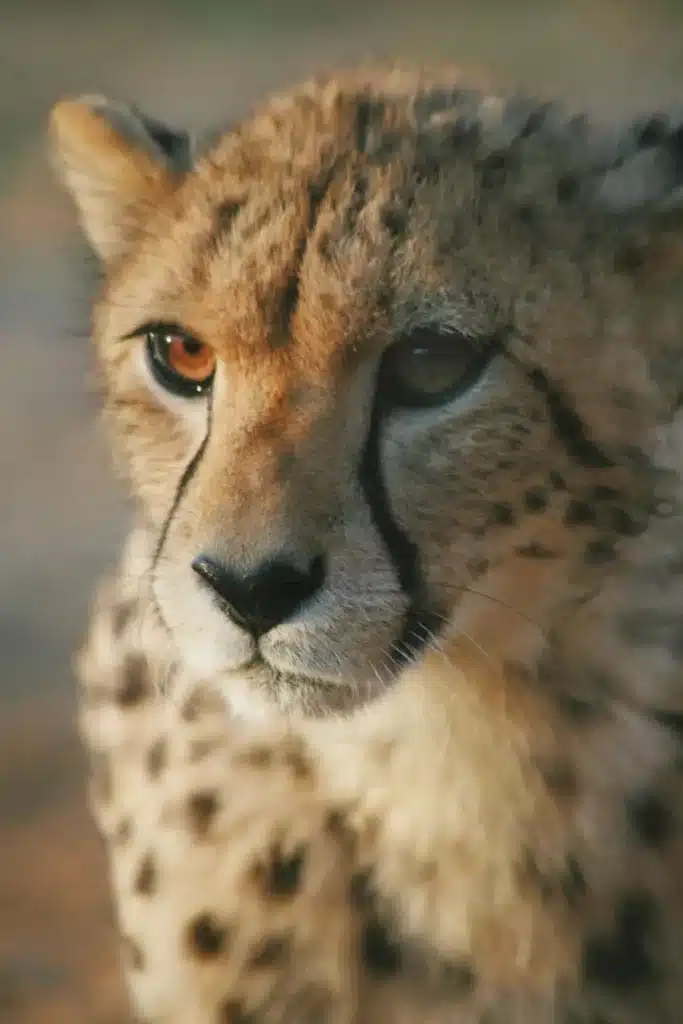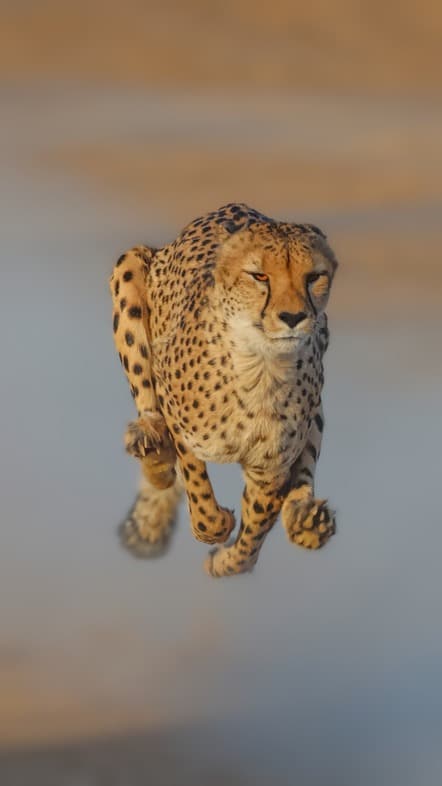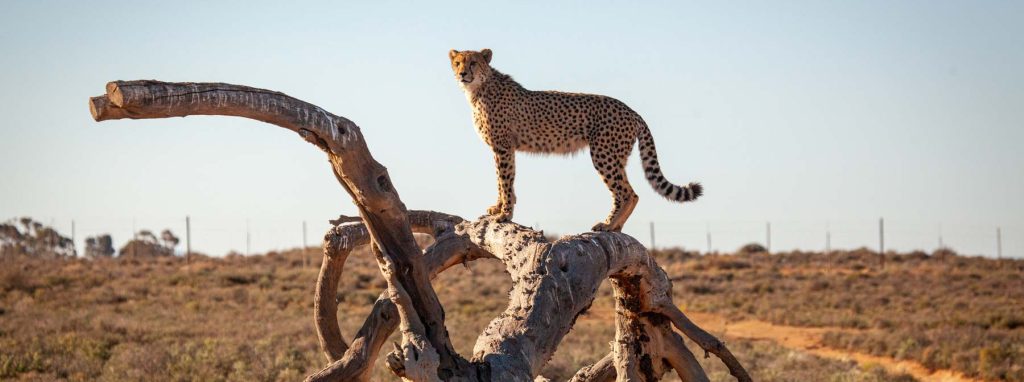Menu
New ownership of Inverdoorn Private Game Reserve welcomed a revolutionary model for cheetah conservation and wildlife rehabilitation in South Africa. Just days after taking ownership of the reserve, Searl Derman, founder and owner of the Aquila Collection, made a bold industry announcement that a strict “no touch” policy and animal-welfare ethics committee was to be immediately implemented.
Today, the cheetah conservation programme, with its responsible and ethical format, offers an engaging guest experience, providing valuable community involvement within Inverdoorn’s rehabilitation initiatives while also providing vital cheetah educational opportunities for guests on safari.
Staying true to the reserve’s core wildlife conservation focus, the cheetah programme’s ongoing efforts work towards rehabilitating and releasing captive-bred or injured cheetahs back to the wild.
Inverdoorn’s cheetah conservation activities and optional safari add-ons include:
The initial committee inspection of the Inverdoorn Cheetah Conservation project confirmed 15 animals in captivity — cared for by experienced and dedicated handlers. The animals have excellent quality of life which ensures they remain in good condition.
Previously, guests were allowed to touch the animals during various times on their safari stay but, since the implementation of the policy update, all animals interactions have been stopped. As part of the new rehabilitation process, a number of cheetah still have to run for their supper by chasing a lure down a runway—reaching speeds of up to 120kmph. At the end point, they are rewarded with food. Overnight Safari Guests are invited to observe this incredible scene from an elevated vantage point.

Cheetah are easily identified by their golden coats and solid black spots. Their facial markings, identified by two black tear-marks, are also distinct.

Cheetahs are natural-born runners. Famous for being the world’s fastest land animal, they can reach speeds of up to 120 kilometres per hour / 75 miles per hour.

Cheetahs are remarkably agile, with a flexible skeleton that helps them manoeuvre and long, muscular tail that helps them ‘steer’ while running at high speeds.
Inverdoorn is continuously working to achieve the goal of a Global Conservation Project, bringing together wildlife enthusiasts and much-needed support from all around the world. Following the success of our cheetah rescue initiative, Inverdoorn’s conservation project is seeking to evolve the current rehabilitation project and we are calling on corporate sponsors to help fund a 5000-hectare release area.
Sponsorship requests are made in various forms, from monetary donations to the supply of much-needed products and resources. The call for aid comes at a crucial time during the success of our cheetah breeding and rehabilitation programme, as the reserve embarks on a massive project—building a 5000 hectare, fenced area for the cheetahs to co-exist with other large wildlife (rhino, buffalo, giraffe) as well as other suitable prey (springbok, blesbok, ostrich).
Inverdoorn's cheetah rehabilitation camps are designed to promote natural interactions between the cheetahs, which has led to the successful birth of three litters, a rare achievement in captivity.
In the final stages of rehabilitation, it is important to expose animals to stimuli that they will encounter in the wild, such as prey, opportunities to run and mate, and other animals of their species. This helps to prepare them for release and increase their chances of survival.
Three months before release, animals are typically given only whole-body diets, fast days are increased, and human contact is restricted. This helps to wean the animals off human dependence and encourage them to hunt and forage for food on their own.
The programme includes one fast day per week, which mimics the natural hunting behaviour of the cheetah. The areas are also positioned for optimal natural enrichment, including high vantage points, trees for shade and exercise, water holes, and other items such as skins, bones, and hooves.
Cheetah diet and exercise are extremely important to their well-being, and we greatly prioritize this at our reserve.
We provide our cheetahs with a varied diet, including full-feathered birds, red meat, game meat, and rabbit. This diet is designed to meet their nutritional needs and to help them maintain a healthy weight.
Creating awareness of the need for cheetah conservation is the primary focus. Educational initiatives are vital to create awareness and gather support from local communities, tourists, corporations and the government.
Anti-poaching campaigns are important to eradicate snares and wildlife traps which inadvertently result in cheetah losses. Putting a stop to the illegal wildlife trade of pelts is also essential.
Research into cheetah behaviour and natural habitats is a growing sector in cheetah conservation as the main threats to cheetahs in South Africa include conflict with humans and livestock, the loss of prey, changes to habitat, and illegal poaching.
These threats have led to a dramatic decline in wild cheetah populations across the country. Conservation efforts, like Inverdoorn's Cheetah Rehabilitation programme which oversaw the reintroduction of captive breed cheetahs back into the Karoo wild, are necessary to protect and preserve this endangered species.
The main threats to cheetahs include conflict with humans and livestock, loss of prey, habitat change, and illegal trade. These threats have led to a dramatic decline in cheetah populations, and conservation efforts are needed to protect and preserve this endangered species.
In South Africa, in particular, has an intricate and diverse ecosystem. Every animal and plant, from the smallest of dung beetles to the largest of elephants, has an important role in maintaining the balance of the ecosystem. If cheetahs no longer existed, there would be a domino effect referred to as a trophic cascade.
Big cats and predators are vital in maintaining population levels which helps to sustain the health of the environment and availability of resources. Cheetahs live primarily in grasslands and benefit the ecosystem by keeping the animals they hunt at healthy population levels.
Cheetahs are unique predators as they hunt during the day and can survive in arid and sparsely-populated environments. They typically hunt the weak and slowest of several species of small to medium-size antelope (which lions, hyenas and even leopards are unlikely to hunt).
Cheetah populations in protected areas (safari parks and game reserves) have seen promising growth, while those outside of well-protected areas have plummeted. Increasing the population range of cheetahs and reintroducing them back to well-protected habitats and historical territories is critical to their long-term success and conservation in the wild.

Copyright© Aquila Collection. Inverdoorn Private Game Reserve is part of the Aquila Collection.